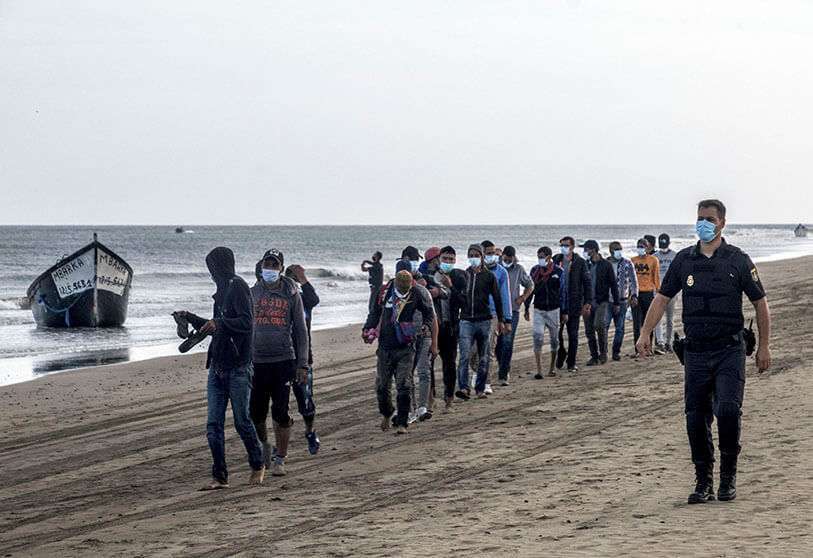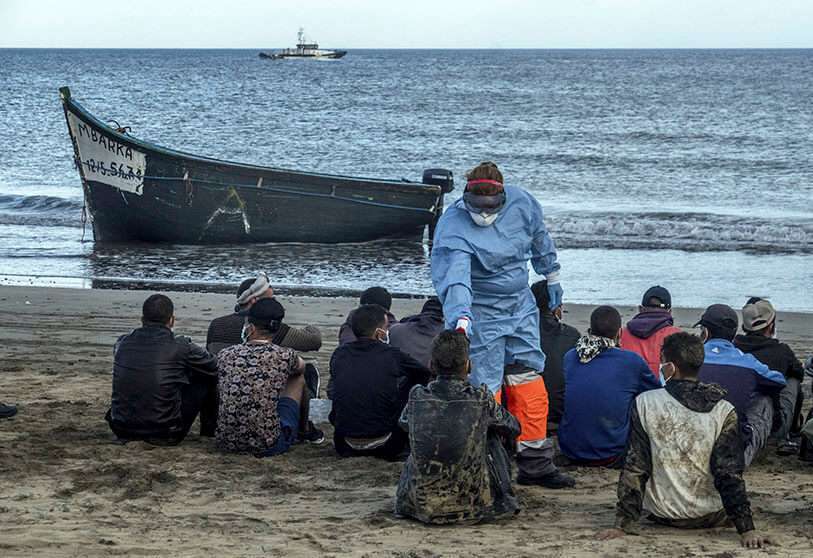Sub-Saharan immigration of the pandemic

The Canary Islands have received more than 11400 immigrants in the last 10 months. In this month of October alone more than 5000 people have arrived. The islands were not in a similar migration crisis since the Cayucos crisis of 2006. The strong economic impact that the pandemic is having, added to the political-security instability of the Sahel and West Africa, has provoked this surge in immigration to the Canary Islands. The economies of the countries of origin have not been able to withstand the confinement measures and the disappearance of tourism, leaving tens of thousands of people without work and without a livelihood. In Europe, all those who have been unable to work have received state aid and have received some form of unemployment benefit. This has not been the case in any of the countries confined to the other side of the Mediterranean. Another reason why the Canary Islands route has been the most used is because of the closure of Morocco's land border with Spain and the increase in European border controls due to the coronavirus crisis. All this has led to an increase in the number of immigrants who have reached the Canary Islands' coasts.

Of all the boats that leave, many cayucos drift between Morocco, Senegal or Mauritania and the Canary Islands, causing hundreds of deaths so far this year. This past 30 October, fifty immigrants died near Mauritania following an engine breakdown that rendered the cayuco useless. The 24 survivors were rescued by the Mauritanian security forces and will be repatriated. In addition to this incident, another similar patera accident took place this past August, leaving a further 27 dead. The route to the Canary Islands, known as the Canarian route, is the most dangerous in the whole of Europe. According to the International Organisation for Migration, one out of every twenty migrants has died at sea trying to reach the coast between January and July 2020. On the rest of the European routes, deaths are lower when compared to people arriving in port. The route to Italy and Malta, known as the central route, the ratio is one in 54, on the route from the Strait of Gibraltar to the Alboran Sea, one in 94 has died or disappeared, and finally, on the eastern Mediterranean route, in the Aegean Sea, one in 115 migrants who have reached the coast have died.

The European agency Frontex has sent seven agents to assist in the identification of migrants and is holding talks with the Spanish government to carry out operations to curb the arrival of migrants along the Canary Islands route in the long term. The mandate of the seven agents is limited to supporting the National Police and exchanging information regarding the mafias and the departure points of these migrants. In the 2006 crisis, Frontex also collaborated with Spain in the framework of Operation Hera, in which boats and planes from several European states were deployed to prevent the departure of the boats from the African coast. This operation reduced the flow of 31,678 immigrants to 12,478 in 2007 and 9-191 in 2008, according to data from the Ministry of the Interior and the Government Delegation in the Canary Islands. With Mauritania and Senegal, Spain maintains close operational collaboration in the fight against irregular immigration and trafficking in persons and illegal substances, and both have been key partners in ending the crisis of 2006. Cooperation in the field of training and equipping the security forces of both states by the Spanish National Police and Guardia Civil has been crucial in ensuring that not a single patera has left Senegal for the Canary Islands between 2009 and 2017. In Dakar, Spain has two permanent Guardia Civil vessels. In Mauritania, Spain also has two patrol boats and a rescue helicopter deployed. An ocean-going vessel and a maritime patrol plane are regularly sent to both countries.

Because of this upturn in immigration flows to the Canary Islands, Spain has committed itself to financing the coastguards and border police in the countries of origin to prevent them from leaving. To this end it has multiplied the allocations for equipping and training the security forces of the African countries. Among the countries to which funds have been multiplied are The Gambia and Guinea Conakry, from 50,000 in 2018 to 75,000 in 2019 respectively. Mali, Ghana and Côte d'Ivoire have also received grants for their state security forces. Morocco has been the largest recipient of grants, with 32 million euros in 2019. After this departure was approved, arrivals from the Moroccan coast via the Straits route have fallen exponentially. The route through the Strait of Gibraltar has become so impenetrable that it is practically impossible for many immigrants to pay for it. According to the testimony of several of the travellers in small boats, the cost of the boat that leaves the north of Morocco amounts to 3000 euros. This has been one of the reasons why the entry route from Western Sahara to the Canary Islands has been rehabilitated and why a large number of Moroccans have been identified on the Canary Islands' coasts, which was not the case until now.
Apart from collaboration with Frontex and the African governments, Spain, after eight months of closing airspace owing to the health crisis, is reactivating deportations to some countries of origin such as Mauritania. Mauritania and Morocco are two of the countries that accept the return not only of their nationals but also of migrants from third countries who have transited through their territory to reach Spain. These agreements speed up the work of expelling some Africans who refuse to give their details of origin, making it extremely difficult to know their country of origin. Furthermore, not all countries have agreements on return. However, taking into account the political tensions following the elections in Guinea, and Côte d'Ivoire and the coup d'état in Mali, this type of deportation is sometimes criticised in that some of them would potentially be entitled to asylum or even refugee status, but they are not informed in time and form of this possibility, according to the Ombudsman and the UNHCR. Unfortunately, the problem of irregular immigration will continue to grow due to the devastating economic consequences of the pandemic. In addition to strengthening controls and providing resources to the security forces of the states of origin, it is essential to invest in development cooperation and to ensure that it reaches those most in need so that they do not find themselves in the situation of emigrating in the very precarious conditions in which they do so, by the most dangerous route in Europe.









